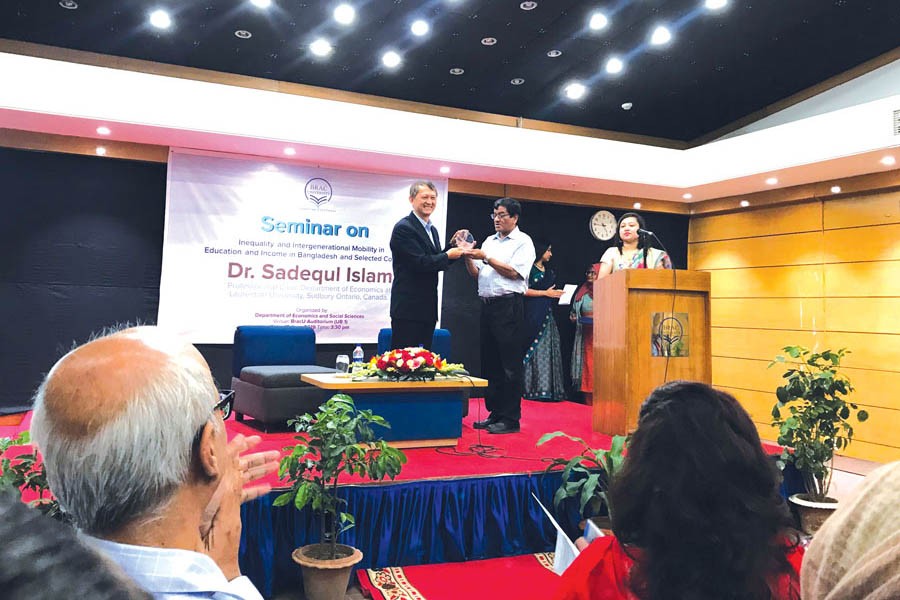Despite being one of the fastest growing economies in the world, Bangladesh has a long way to go in terms of making education accessible to all and reducing poverty. To better comprehend and track Bangladesh's performance in these aspects in contrast with other economies, the role of economics research is indispensable.
Dr Sadequl Islam, professor and chair, Department of Economics at Laurentian University, Sudbury, Ontario, Canada presented his paper at the seminar on Inequality and intergenerational mobility in education and income in Bangladesh and selected countries organised by Department of Economics and Social Sciences, Brac University on June 19, 2019. The paper was presented in presence of Brac University Vice Chancellor Professor Vincent Chang, Pro Vice Chancellor Professor Mohammad Tamim with Chairperson of the Department of Economics and Social Sciences in Brac University Professor ATM Nurul Amin as the moderator. Faculty members of the Department of Economics and Social Science, researchers, young and aspiring economists attended the seminar and engaged in academic discourse.
Dr Sadequl Islam presented Bangladesh's performance through the metrics -- absolute upward intergenerational mobility (IGM) and relative upward intergenerational mobility. Absolute upward intergenerational mobility measures the extent to which the levels of education or income of the current generation is higher than those of their parents. On the other hand, relative IGM measures the extent to which an individual's position on the economic ladder is independent of the socio-economic background of his or her parents.
For sustained economic growth, both absolute and relative IGM are essential. Dr Sadequl thinks Bangladesh has made outstanding progress in absolute IGM. Relative IGM is still low in case of Bangladesh. Higher relative IGM across generations are associated with lower inequality of opportunity and circumstances. Thereby, high variation is a persistent challenge faced by Bangladesh.
Dr Sadequl's paper showed that with roughly 65 per cent of girls receiving education levels higher than that of their fathers, Bangladesh is outperforming India and Pakistan in terms of absolute IGM in education, and the success rate is exceptionally high in female education. Nonetheless, number of successful women professionals is fewer compared to number of successful female students. “We see many successful female students, but we don't see as many successful female leaders being created,”opined Dr Wasiqur Rahman Khan, professor of Economics and Social Sciences, Brac University.
As educational resources are being centred on the capital and there are only a few good institutions, inequality of opportunity is being further strengthened. To bridge this gap and achieve higher relative intergenerational mobility across the generation, Professor Sadequl Islam said government policies must be re-designed to allocate more resources to schools in relatively poor and remote areas. He stressed the need for more quality economics research on education and sustainable growth.
Inspiring young economists to research equal access to education and to eradicate inequality in mind, Professor Chang said, “Some people are struggling not because they're not smart, simply because they lack opportunities.”
The writer is studying Electrical and Electronic Engineering (EEE) in Brac University. She can be reached at [email protected]


